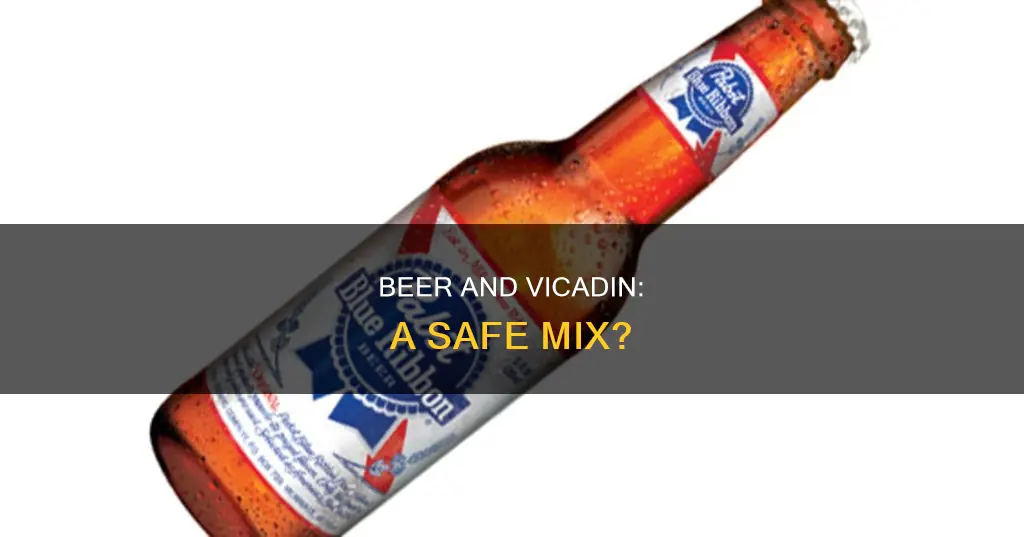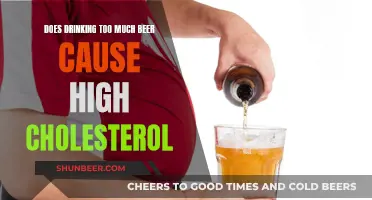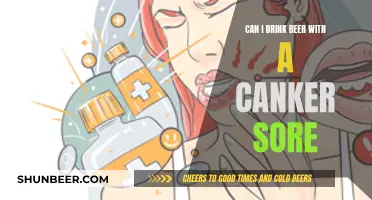
Vicodin is a prescription painkiller that can be highly addictive. It is a composite mixture of hydrocodone and acetaminophen. The hydrocodone in Vicodin is an opioid, which is classified as a depressant. It is prescribed for moderate to severe short-term pain. Depressants slow down the central nervous system (CNS), which is responsible for sending signals across the spinal cord and brain. When mixed with alcohol, a CNS depressant, the combination can slow down the CNS to the point where the brain fails to send signals to the body to breathe, which can be fatal.
What You'll Learn

The dangers of mixing Vicodin and alcohol
Mixing Vicodin and alcohol can be extremely dangerous and can lead to a host of short- and long-term health issues. It can even be fatal.
Vicodin is a prescription painkiller that contains hydrocodone and acetaminophen. Hydrocodone is an opioid that alters the way pain signals interact with the brain. Acetaminophen, meanwhile, is a pain and fever reducer that is also sold over the counter.
Alcohol is a depressant that slows down the central nervous system (CNS). It affects almost every organ in the body, including the lungs, and slows down brain function, which in turn affects coordination, muscle control, and energy levels.
Both Vicodin and alcohol slow down the CNS, which is responsible for sending signals across the spinal cord and brain, including those that control breathing and heart rate. When mixed, they can slow down the CNS to the point where the brain fails to send signals to the body to breathe, which can lead to death.
The combination can also cause respiratory distress, with symptoms such as a change in skin colour (usually blue around the mouth and fingertips), sweating with cool or clammy skin, and wheezing. It can also lead to extreme sedation, confusion, sleepiness, and liver damage.
Overdose risk
Mixing Vicodin and alcohol increases the risk of overdose. In 2017, 14.7% of opioid deaths involved alcohol, and overdoses involving alcohol and opioids increased 5.5-fold from 1999 to 2017.
Signs of overdose
If you experience any of the following symptoms after taking Vicodin and alcohol, seek immediate medical attention:
- Slow breathing
- Reduced heart rate
- Cold, clammy skin
- Pinpoint pupils
- Drowsiness
- Confusion
- Muscle spasms
- Loss of consciousness
Addiction
If you are unable to stop drinking while taking Vicodin, you may be addicted to one or both substances. If you are struggling with addiction, seek professional help.
Beer Drinking: Weight Loss or Health Risk?
You may want to see also

The addictive nature of Vicodin
Mixing alcohol and Vicodin can be extremely dangerous and even deadly. Both substances are central nervous system (CNS) depressants, which slow down the nervous system and slow breathing and heart rate. When combined, their effects are amplified, which can lead to respiratory depression, brain damage, coma, and even death. The mixture can also cause kidney damage and acute liver failure.
Vicodin is a prescription painkiller that contains hydrocodone, a synthetic opioid, and acetaminophen, the active ingredient in Tylenol. The hydrocodone in Vicodin is highly habit-forming and activates the same reward centre of the brain as drugs like cocaine or heroin. This means that Vicodin has a high risk for addiction and abuse.
The Drug Enforcement Agency (DEA) in the US currently labels Vicodin as a Schedule II controlled substance, which means it has a high potential for abuse. The DEA tightened restrictions on the distribution of Vicodin to prevent sales to unlicensed users and protect patients from abuse or misuse.
Vicodin is often prescribed to patients experiencing severe pain after surgery or a serious accident. However, because of its addictive nature, many people continue to use it even after the initial pain has subsided. Repeated use of Vicodin can lead to physical dependence, and many people will continue using the drug to avoid painful withdrawal symptoms.
Signs of Vicodin addiction include:
- Taking Vicodin in larger amounts or for longer than intended
- Trying to cut down or stop using Vicodin but failing to do so
- Spending a lot of time obtaining, using, or recovering from the use of Vicodin
- Experiencing cravings and urges to use Vicodin
- Continuing to use Vicodin despite negative consequences, such as problems in relationships or difficulty fulfilling obligations at work, home, or school
- Giving up important activities because of Vicodin use
- Using Vicodin in situations where it is physically dangerous
- Developing a tolerance to Vicodin, needing higher doses to achieve the same effect
- Experiencing withdrawal symptoms when not taking Vicodin, which can be relieved by taking more of the drug
If you or someone you know is struggling with Vicodin addiction, it is important to seek professional help. Treatment options include detoxification, inpatient rehabilitation, and outpatient treatment services.
Beer and Zoloft: What You Need to Know
You may want to see also

The side effects of mixing Vicodin and alcohol
Mixing Vicodin and alcohol can have severe consequences, including death. Both substances are central nervous system (CNS) depressants, which slow down the CNS. When combined, their effects are amplified, and they can induce respiratory depression, brain damage, coma, and death. The mixture can also cause kidney damage, acute liver failure, and permanent nerve damage.
- Trouble remembering things
- Difficulty concentrating
- Uncontrolled eye movements
- Slow breathing
- Reduced heart rate
- Cold, clammy skin
- Pinpoint pupils
- Drowsiness
- Confusion
- Muscle spasms
- Loss of consciousness
Mixing alcohol and Vicodin can also increase the risk of an overdose, as the alcohol can speed up the release of the drug into the bloodstream. This combination can also lessen the effectiveness of naloxone (Narcan), a medication used to reverse an opioid overdose.
Vicodin is a prescription painkiller that contains hydrocodone and acetaminophen. Hydrocodone alters the way that pain signals interact with the brain, while acetaminophen reduces pain and fever. Even though acetaminophen is sold over the counter, it should not be mixed with alcohol as it can increase the risk of kidney disease.
If you are struggling with addiction to Vicodin, alcohol, or both, it is important to seek professional help. Treatment options are available, including detoxification, inpatient rehab, and outpatient rehab.
Beer and Non-Alcoholic Beer: Can They Mix?
You may want to see also

The signs of addiction to Vicodin and alcohol
Combining alcohol and Vicodin can have fatal consequences. Alcohol enhances Vicodin's muscle relaxant effects, which can slow down or even stop your heart and lungs. If you are unable to stop drinking while on Vicodin, you may be addicted to one or both substances.
Behavioural symptoms
- Visiting multiple doctors to obtain multiple Vicodin prescriptions
- Compulsive, prolonged use of Vicodin, despite attempts to stop
- Using Vicodin in dangerous situations, such as while driving
- Neglecting responsibilities at home or work, including frequent absences from work
- No longer engaging in activities or hobbies that were once considered important
- Withdrawing from friends and family
Psychosocial symptoms
- Feelings of euphoria followed by a state of apathy
- Loss of interest in things once interested in
- Dysregulation of mood
- Anxiety and panic attacks
- Suicidal thoughts and feelings
Physical effects
- Loss of motor control
- Brain damage
- Kidney problems
- Pancreatitis
- Heart infection
- Oxygen deficiency in the body's tissues
- Impaired visual acuity
- Dry nose and mouth
- Onset or worsening of mental illness symptoms
- Decline in occupational performance
Fruit Beer and Kids: Is It Safe?
You may want to see also

The treatment options for Vicodin and alcohol addiction
Mixing alcohol and Vicodin can be extremely dangerous and even fatal. Both substances slow down the central nervous system, and when combined, their effects are amplified, potentially causing respiratory depression, brain damage, coma, and death. They can also cause kidney damage and acute liver failure. If you are struggling to stop drinking alcohol while taking Vicodin, you may be addicted to one or both substances.
Treatment for Vicodin and alcohol addiction typically begins with detoxification, which lasts about seven days. During this time, you will be monitored by doctors in a hospital setting for withdrawal symptoms such as nausea and vomiting.
After detoxification, you may be ready for an inpatient rehabilitation treatment program. This type of program requires you to live at a rehabilitation center, where you will participate in group and individual therapy sessions, as well as 12-step programs, to help you learn how to live without Vicodin and alcohol. The duration of inpatient rehabilitation varies depending on the severity of the addiction, typically ranging from 30 days to one year.
Once you have completed inpatient rehabilitation, you may benefit from outpatient treatment services. During this stage, you can live at home while still receiving therapy and other treatments at the treatment center. Outpatient treatment can help you stay committed to your new lifestyle and reduce the risk of relapsing into Vicodin and alcohol use.
If you or someone you know is struggling with addiction to Vicodin and alcohol, it is important to seek professional help. There are many treatment options available, and recovery is possible.
Wellbutrin and Beer: Is It Safe to Mix?
You may want to see also
Frequently asked questions
Mixing alcohol with Vicodin can slow down your nervous system to dangerous levels, leading to shallow or slow breathing, reduced heart rate, confusion, drowsiness, and even death.
Common side effects include trouble remembering things, difficulty concentrating, uncontrolled eye movements, and loss of consciousness.
Combining alcohol with Vicodin can lead to respiratory depression, brain damage, coma, and death. It can also cause kidney damage, acute liver failure, and permanent nerve damage.
There is no safe amount of alcohol that can be consumed with Vicodin. Even a single drink can speed up the release of Vicodin into your bloodstream, increasing the risk of overdose and severe health consequences.







